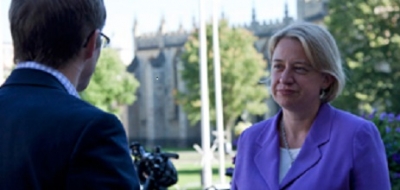Many people will have listened in to Natalie Bennett, the Leader of the Green Party’s “excruciating” interview on LBC today. A fair number of them may well have switched channels half way through, unable to bear the cringing any longer.
Those who seek to criticise Bennett should spare her some sympathy. Media interviews are not easy. LBC’s Nick Ferrari is not known as the most sympathetic of hosts. But Bennett could have made life a lot easier for herself, and the campaign launch a lot more successful for the Green Party, if she had taken some straightforward steps ahead of the interview.
To support the Green leader ahead of her next media round, and anyone about to go before the microphone or cameras, here are some simple tips:
– Work out what you want to say
Bennett’s interview may have seemed to go on for a very long time, potentially because of the long periods of silence, but it was actually less than 4 minutes long. Every interview should be treated like a race. Get your key messages out quickly, set the tone of the interview and, importantly, set the parameters of what you’re there to talk about.
– Work out what they want to say
While it’s not always possible to guess the exact questions, there is a lot you can do in advance to help you plan. Firstly, talk to the producer of the programme; ask what angle they’re taking, can they tell you the questions, how long will the interview be, and is there anything specific they will want to discuss? Listen to some of their previous interviews, get a feel for their style. Are they a John Humphrys or an Evan Davis? And lastly, check out what’s in the headlines that morning. You don’t have to be an expert on every story of the day, but it helps to know how your interview might fit in with the political agenda.
– Say it over and over again
It is natural to lose your train of thought. Even the greatest communicators go blank from time to time. The trick is to have rehearsed a line so many times, that it comes out automatically. It’s your fall back, your port in a storm, when all else fails it still comes out.
– Take your notes in
Although not possible in a television interview, the luxury of no cameras in a radio studio means you can have notes with you (this even counts for radio programmes with a webcast). The trick with notes is to have the key facts easily to hand. As shown by the leader of the Greens, in the heat of the moment it can be all too easy to add an erroneous decimal point. Write down some key prompt words and the figures.
– And finally, ask a professional




